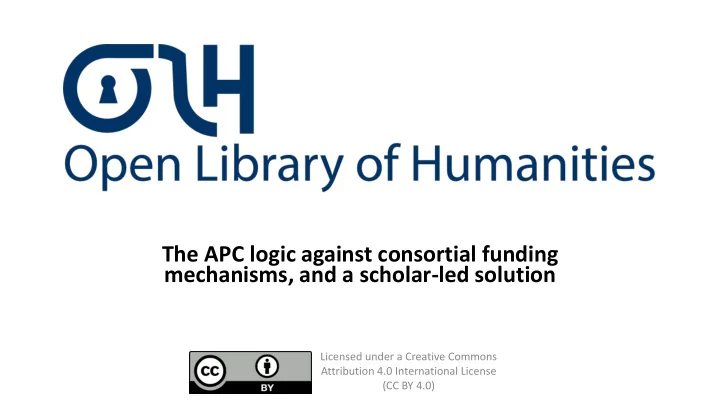

The APC logic against consortial funding mechanisms, and a scholar-led solution Licensed under a Creative Commons Attribution 4.0 International License (CC BY 4.0)
What is research and why do we write it? To be read. To be assessed.
Dis issemination: : Quality Control, , Vali lidation and Space-Time Compression • Dissemination of work • Preservation of record • Footnotes and scholarly genealogy (vs. science?) • Labour of reading: reading- avoidance techniques
Peer-reviewed research Free to read online Permission to re-use Gold: at publisher/source Green: institutional/subject repository Bronze: Available on a publisher website, but not licensed Gratis: free to read Libre: free to re-use
Number of articles (A) and proportion of articles (B) with OA copies, estimated based on a random sample of 100,000 articles with Crossref DOIs. Fig. 2, From Piwowar, H. et al. (2018), The state of OA: a large-scale analysis of the prevalence and impact of Open Access articles, https://doi.org/10.7717/peerj.4375
Number (A) and proportion (B) of articles with OA copies, by publisher, for the 20 most prolific publishers. Based on sample of 27,894 Crossref DOI-assigned articles published between 2009 – 2015. Fig. 3, From Piwowar, H. et al. (2018), The state of OA: a large-scale analysis of the prevalence and impact of Open Access articles, https://doi.org/10.7717/peerj.4375
A matter of f dis istribution: : there are 100 people in in a room for a talk lk • They have $10 each • The speaker speaks for free • The venue needs $50 to cover its staff costs • There are 40 talks per year
Subscription logic • Each person pays $0.50 and hears the talk • No payment, no entry • Each person can only afford half of the talks • The general public cannot attend
OA wit ith an Art rticle Processing Charge lo logic • The speaker pays the full fee ($50) • The problem is that the speaker only has $10 • The general public and all others can attend
OA wit ith consortial lo logic • 5 people attend each talk and pay $10 each • They let anyone else attend for free • Everyone can hear 50% of the talks, including the public
This is is is how OA lo looks in in a dry fu funding cli limate • Is the “venue” overcharging? • The distribution of the economics is the most important thing • APCs do not work well in the humanities and elsewhere
Megajournal / Multijournal / Not-for-profit / Collectively Funded
Support fr from the Andrew W. . Mellon Foundation • $90,000 planning grant • University of Lincoln, UK, 2014-2015 • $741,000 sustainability grant • Birkbeck, University of London, UK, 2015-2018
Ongoing Project to “Flip” Subscription Journals Six additional journals joined in January 2017
Licensed under a Creative Commons Attribution-NoDerivatives 4.0 International License (CC BY-ND 4.0)
>240 Libraries Financially Supporting the OLH in First Year
23 Jo Journ rnals ls on or r Su Supported by th the Pla latform (9 (909 art rtic icle les in in fir first year) r) Cost per institution per article: around $1.10 per institution per article. Target of 300+ libraries by end of year three. 118,686 unique readers. Average of 131 readers per article. $0.008 per per ins nstit itutio ion per per read eader.
Key events in the recent history ry of f OLH February 2018 – OLH begins a new phase of expansion, supported by funding from OpenAIRE for marketing and communications activities March 2018 – Huddersfield University Press becomes the first institution to host its journals on the Janeway platform March 2018 – OLH launches the EmpowOA scheme, a new marketing inititiative designed to strengthen humanities OA with blog posts, social media conversations, a new referral deal, and open access resources (including this presentation) April 2018 - Université de Lorraine cancels its Springer OA “Big Deal” and supports a portfolio of scholar-led initiatives instead. One of the beneficiaries is OLH, our first French consortium member May 2018 – The British Library joins the OLH consortium, demonstrating an increasing strategic investment in non-APC scholar-led initiatives
What can I I do to support the OLH? Refer a friend: If your institution is a member of the OLH consortium, you can refer a new member for a mutual 10% discount https://www.openlibhums.org/refer/ Join the OLH: Shift your perspective from subscriptions, APCs and “big deals” to supporting a diverse collection of scholar-led initiatives, including the OLH https://www.openlibhums.org/plugins/supporters/signup/ Stand up for the humanities: Become an OLH advocate today! https://goo.gl/forms/b1uc1pU3EX9WvoAW2
How can the OLH support you? Resources: See our advocacy page for posters, infographics, FAQs and a growing list of other tools https://www.openlibhums.org/site/about/advocacy/ Learn more about humanities OA: Our Open Insights essay series contains a growing back list of interviews and essays on a wide range of topics https://www.openlibhums.org/news/tag/Open%20Insights/ Join the debate: Follow our Twitter account (@OpenLibHums) and the #EmpowOA tag for information about twitter chats https://wakelet.com/@OpenLibHums
The End Thank you! Presentation licensed under a CC BY 4.0 license. All institutional images excluded from CC license.
Recommend
More recommend